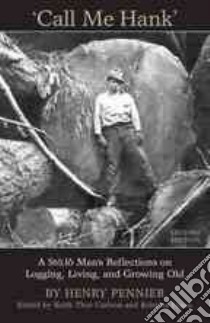Call Me Hank - 9780802091611
Un libro in lingua di Carlson Keith Thor (EDT) Fagan Kristina (EDT) edito da Univ of Toronto Pr, 2006
- € 55.40
- Il prezzo è variabile in funzione del cambio della valuta d’origine
'My name is Henry George Pennier and if you want to be a friend of mine please you will call me Hank.' So begins 'Call Me Hank,' the autobiography of Hank Pennier (1904-1991): logger, storyteller, and self-described 'halfbreed.' In this work, Pennier offers thoughtful reflections on growing up as a non-status Aboriginal person on or near a Stó:lõ reserve, searching for work of all kinds during hard times as a young man, and working as a logger through the depression of the 1930s up to his retirement. Known only to a small local audience when it was first published in 1972, this expanded edition of Pennier's autobiography provides poignant political commentary on issues of race, labour, and life through the eyes of a retired West Coast Native logger. 'Call Me Hank' is an engaging and often humorous read that makes an important contribution to a host of contemporary discourses in Canada, including discussions about the nature and value of Aboriginal identity. To Hank's original manuscript, Keith Carlson and Kristina Fagan have added a scholarly introduction situating Hank's writing within historical, literary, and cultural contexts, exploring his ideas and writing style, and offering further information about his life. A map of place names mentioned by Hank, a diagram of a steam logging operation, a glossary of logging terms, and sixteen photographs provide practical and historical complements to Pennier's original lively personal narrative.
Pennier's book preceded the proliferation of Aboriginal writing that began with the publication of Maria Campbell's Halfbreed in 1973 and provides a markedly different view of Aboriginal life than other writings of the period. It also documents important aspects of Aboriginal participation in the wage labour economy that have been overlooked by historians, and offers a unique reflection on masculinity, government policy, and industrialization.
Informazioni bibliografiche
- Titolo del Libro in lingua: Call Me Hank
- Sottotitolo: A Sto:Lo Man's Reflections on Logging, Living And Growing Old
- Lingua: English
- Autori : Carlson Keith Thor (EDT) Fagan Kristina (EDT)
- Editore: Univ of Toronto Pr
- Collana: Univ of Toronto Pr (Hardcover)
- Data di Pubblicazione: 17 Gennaio '06
- Genere: BIOGRAPHY and AUTOBIOGRAPHY
- Argomenti : Salish Indians Biography
- Pagine: 123
- Dimensioni mm: 215 x 146 x 19
- ISBN-10: 080209161X
- EAN-13: 9780802091611


